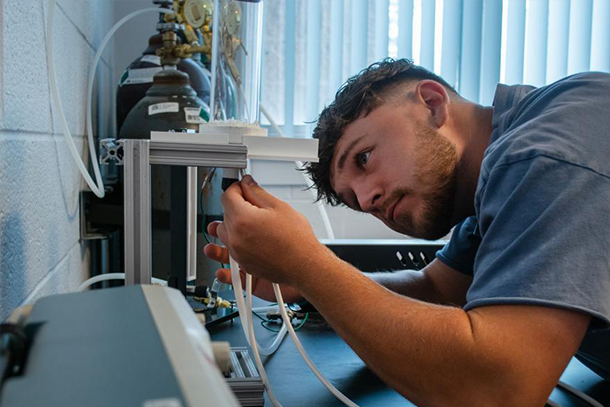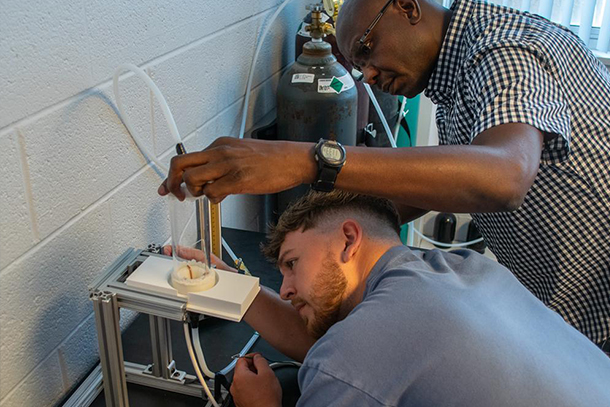
Penn State Harrisburg student Griffen Martello participated in the Multi-Campus Research Experience for Undergraduates. Credit: Sharon Siegfried/Penn State
Harrisburg student researches alternative fuel solution in summer program
Griffen Martello was one of several Harrisburg students who participated in the Multi-Campus Research Experience for Undergraduates this summer
October 19, 2023
Editor’s note: This article first appeared on Penn State News.
MIDDLETOWN, Pa. — Penn State Harrisburg student Griffen Martello, a mechanical engineering major, has varied interests when it comes to engineering. He is interested in the environment but also in petroleum engineering, which he acknowledges seems like a contradiction.
Mostly, he wants to keep his options open. So, when his thermodynamics professor, Dassou Nagassou, asked if he’d be interested in working over the summer on research related to energy and the environment, Martello didn’t hesitate.
Martello spent the summer conducting research through the Multi-Campus Research Experience for Undergraduates (MC-REU) program, led by the Penn State College of Engineering. The program allows undergraduate students to conduct a research project in conjunction with a faculty member from their home campus and one from University Park.
This summer, 31 projects had a connection to Penn State Harrisburg — either with a faculty member or student involved. Projects tackled subjects ranging from climate change to brain cancer.
Martello worked with Nagassou, assistant professor of mechanical engineering at Penn State Harrisburg, and Sean Knecht, associate research professor from the Penn State School of Engineering Design and Innovation.

Penn State Harisburg student Griffen Martello, left, and Dassou Nagassou, assistant professor of mechanical engineering, examine the project that Martello worked on over the summer through the Multi-Campus Research Experience for Undergraduates. Martello sought to improve the design of a plasma chemical gliding-arc reactor, a device that takes carbon dioxide and decomposes it to produce alternative fuels. Credit: Sharon Siegfried/Penn State
Nagassou’s research interests are in renewable energy and plasma engineering — namely, studying the interaction between solar radiation and plasmas to decompose the molecules of carbon dioxide and other greenhouse gases into higher grade compounds that can produce solar fuels.
“My research is mainly to address climate change but in much more of an engineering approach to the problem,” he said. He said he approached Martello after finding him to be a curious student interested in topics related to energy and the environment.
Martello sought to improve the design of a plasma chemical gliding-arc reactor, a device that takes carbon dioxide and decomposes it to produce alternative fuels. The goal of the project is to increase the device's efficiency.
“The goal is years down the line … we can have this on a really large scale where we’re breaking down a lot of [carbon dioxide] into more valuable products,” Martello said.
Martello worked with Nagassou to review existing research, work on redesign options using engineering software, run simulations to determine if more changes were needed and ultimately 3D print prototypes for testing.
Nagassou noted that the program gave Martello experience dealing with challenges that may arise while doing experimental research.
The MC-REU program also gave Martello the opportunity to visit University Park and use lab equipment to which he might otherwise not have had access. The program also brought participants together virtually once a week for large and small group meetings that offered guidance on “every different aspect of the professional world you could think of,” Martello said.
Those sessions covered everything from diversity and ethics training to how to make the most of LinkedIn, he said, and graduate students joined them to share tips for applying to graduate school.
In addition, he said, the opportunity to research and formulate a paper that can be published is beneficial.
“If I’m a published, scholarly writer as an undergraduate student, that’s a big step ahead … especially in a STEM field,” Martello said.
The program has benefits for the students and faculty members involved, Nagassou added.
“It’s a great opportunity for undergraduate students who can immerse themselves in real-time research activities at an early stage," he said. "While they learn a lot during this process, they can also help advance faculty research during summertime. I was impressed by Mr. Martello’s efforts and achievement in supporting my research this summer.”
This story is one of several highlighting Harrisburg students’ work through the Multi-Campus Research Experience for Undergraduates program.



